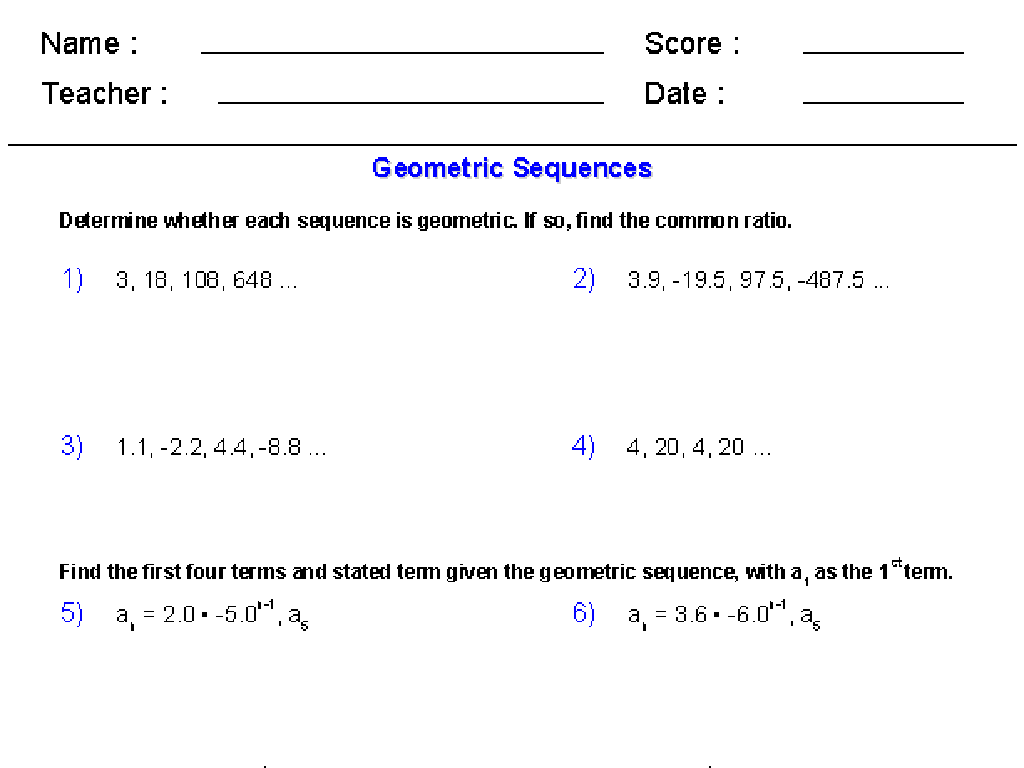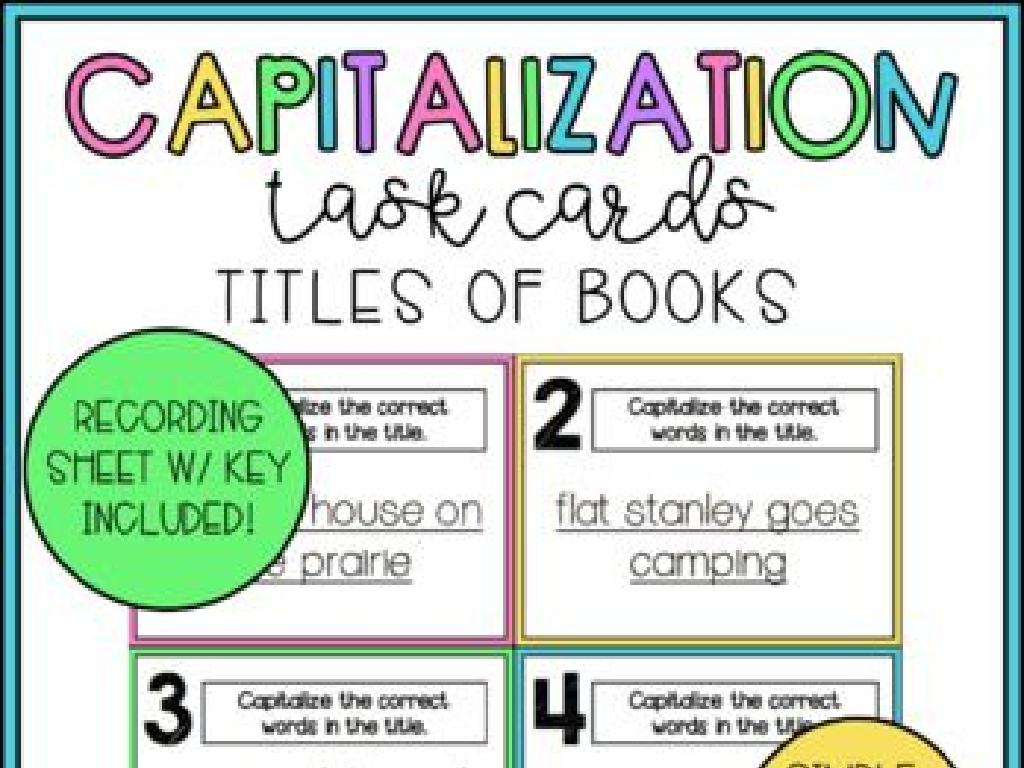Form And Use The Irregular Past Tense: Set 1
Subject: Language arts
Grade: Third grade
Topic: Verb Tense
Please LOG IN to download the presentation. Access is available to registered users only.
View More Content
Exploring Past Tense Verbs
– What are verb tenses?
– Verb tenses tell us when an action happens.
– Defining a verb
– A verb is an action word like run, jump, or think.
– Irregular past tense verbs
– Past tense verbs that don’t follow regular rules.
– Practice with examples
– We’ll learn by turning present verbs to past.
|
This slide introduces the concept of verb tenses, focusing on the past tense. Begin by explaining that verb tenses indicate the time of action or state of being. Highlight that a verb is an action word and can show what the subject is doing. Emphasize that irregular past tense verbs do not follow the simple rule of adding ‘-ed’ to the present tense. Provide examples of irregular verbs and their past tense forms, such as ‘go’ becoming ‘went’ and ‘buy’ becoming ‘bought’. Encourage students to think of verbs they use daily and challenge them to convert those into the past tense. Prepare a list of common irregular verbs for practice.
Regular vs. Irregular Verbs
– Understanding Regular Verbs
– Regular verbs end with ‘ed’ when in past tense
– Exploring Irregular Verbs
– Irregular verbs don’t follow a set pattern in past tense
– Regular Verbs Example
– ‘talk’ becomes ‘talked’, ‘jump’ becomes ‘jumped’
– Today’s Focus: Irregular Verbs!
|
This slide introduces the concept of regular and irregular verbs to third graders. Regular verbs are verbs that follow a pattern when changing to past tense, typically by adding ‘ed’ to the end of the word. Irregular verbs, on the other hand, do not follow this pattern and can change in a variety of ways. Provide examples of regular verbs to illustrate the pattern. For today’s lesson, the focus will be on irregular verbs. Encourage students to think about verbs they already know and consider how they might change in the past tense. This will set the stage for learning specific irregular verbs and using them in sentences. Prepare to engage the students with activities that involve identifying and using irregular verbs in context.
Irregular Past Tense Verbs
– What is irregular past tense?
– Past tense verbs that don’t follow regular rules
– No pattern in irregular verbs
– Examples: go – went, have – had
– ‘Go’ becomes ‘went’ and ‘have’ becomes ‘had’
– Some verbs stay the same: set – set
– The word ‘set’ does not change in past tense
|
This slide introduces the concept of irregular past tense verbs to third graders. Irregular verbs do not follow the typical ‘-ed’ ending that regular past tense verbs do. Provide clear examples to illustrate the concept, such as ‘go’ changing to ‘went’ and ‘have’ changing to ‘had’. Highlight that some verbs, like ‘set’, remain the same in both present and past tense. Encourage students to think of other verbs they know and ask them to try to convert them into past tense, noting which ones are irregular. This will help them understand that they need to memorize these exceptions as there is no easy rule to follow.
Irregular Past Tense Verbs: Set 1
– Understanding irregular verbs
– Verbs that don’t follow regular rules
– Present to Past examples
– ‘become’ changes to ‘became’, ‘begin’ to ‘began’
– Practice pronunciation
– Say them loud and clear together
– Interactive repetition
|
This slide introduces Set 1 of irregular past tense verbs to third graders. Begin by explaining that irregular verbs do not follow the typical ‘-ed’ ending rule when changing from present to past tense. Provide examples of irregular verbs, such as ‘become’ and ‘begin,’ and their past forms ‘became’ and ‘began.’ Engage the class in a group activity where they practice saying these verbs out loud, ensuring correct pronunciation and reinforcing their understanding through repetition. Encourage students to think of other verbs they know and predict their past forms, fostering curiosity and participation.
Using Irregular Past Tense in Sentences
– Forming sentences with irregular verbs
– Example: ‘Yesterday, I saw a movie.’
– ‘Saw’ is the past tense of ‘see’, which doesn’t follow regular rules.
– Practice making sentences
– We’ll create sentences using irregular past tense verbs together.
– Share your sentences with the class
– Think of a fun activity you did and tell us using the past tense!
|
This slide introduces students to the concept of irregular past tense verbs, which do not follow the standard ‘-ed’ ending rule. Start by explaining that irregular verbs change in unique ways when used in the past tense. Use the example provided to show a common irregular verb in context. Engage the class by creating sentences together using a list of irregular verbs. Encourage students to think of actions they have recently done and to describe them using the past tense. This activity will help them understand and memorize irregular verb forms through practice and sharing.
Fun with Irregular Verbs!
– Play the matching game
Match present tense verbs to their irregular past tense forms.
– Role-play past tense verbs
Act out a verb in the past tense and have classmates guess it.
– Create a story together
Use your imagination to make a story with irregular past tense verbs.
– Learn and have fun!
|
This slide introduces interactive activities to help third graders understand and use irregular past tense verbs. The matching game involves cards with present tense verbs that students will match with their irregular past tense counterparts. For the role-play, students can draw a verb from a hat and act it out in its past tense form for others to guess. Story time encourages creativity, asking students to collaboratively construct a story using irregular past tense verbs they’ve learned. These activities cater to different learning styles and help reinforce the lesson in a fun, engaging way. Be prepared with a list of verbs for each activity and ensure that each student has a chance to participate.
Class Activity: Verb Treasure Hunt
– Engage in a verb treasure hunt
– Pair up and seek hidden verbs
– Write down the past tense forms
Look for verbs like ‘go’ and write ‘went’, ‘find’ to ‘found’.
– Share discoveries with the class
|
This interactive activity is designed to help students recognize and use irregular past tense verbs in a fun and engaging way. Before starting, hide cards around the room with irregular verbs in their present tense form. Instruct students to work in pairs to find these cards and write down the past tense of each verb they find. After the hunt, each pair will share their list with the class, and the class can discuss the changes in the verbs from present to past tense. This activity not only reinforces the concept of irregular verbs but also encourages teamwork and communication among students. Possible verbs to include are ‘run’, ‘come’, ‘see’, ‘begin’, and ‘draw’. Make sure to prepare a list of irregular verbs and their past tense forms for reference during the activity.
Irregular Past Tense Verbs: Review & Practice
– Review learned irregular verbs
– Look back at verbs like ‘go’ turned into ‘went’
– Practice with fill-in-the-blanks
– Use verbs in sentences: ‘He ___ to the store yesterday.’
– Get ready for more verb fun
– Exciting activities ahead to master verbs
– Understanding through repetition
– Practice helps us remember these special verbs
|
This slide is aimed at reinforcing the irregular past tense verbs that the students have previously learned. Start by reviewing the list of irregular verbs, such as ‘go’ becoming ‘went’, ‘come’ turning into ‘came’, etc. Then, move on to a fill-in-the-blanks activity where students must choose the correct irregular past tense verb to complete the sentences. This will help them apply what they’ve learned in a practical context. Prepare them for the upcoming lessons by hinting at more engaging activities that will further deepen their understanding of verb tenses. Emphasize the importance of practice in mastering these irregular forms, as repetition will aid in cementing these concepts in their memory.
Homework Challenge: Irregular Past Tense Verbs
– Take home your verb list
– Write 5 sentences with past tense verbs
– Choose verbs that don’t follow regular rules
– Use irregular past tense forms
– Examples: ‘run’ becomes ‘ran’, not ‘runned’
– Share your sentences in class tomorrow
|
This homework task is designed to reinforce the lesson on irregular past tense verbs. Students should refer to the verb list provided during class to identify irregular verbs, which do not follow the typical ‘-ed’ ending pattern. Encourage them to write meaningful sentences that reflect their understanding of the past tense form of these verbs. Remind them to check their work for accuracy. In the next class, create a supportive environment for students to share their sentences, fostering peer learning and confidence in using irregular past tense verbs.






